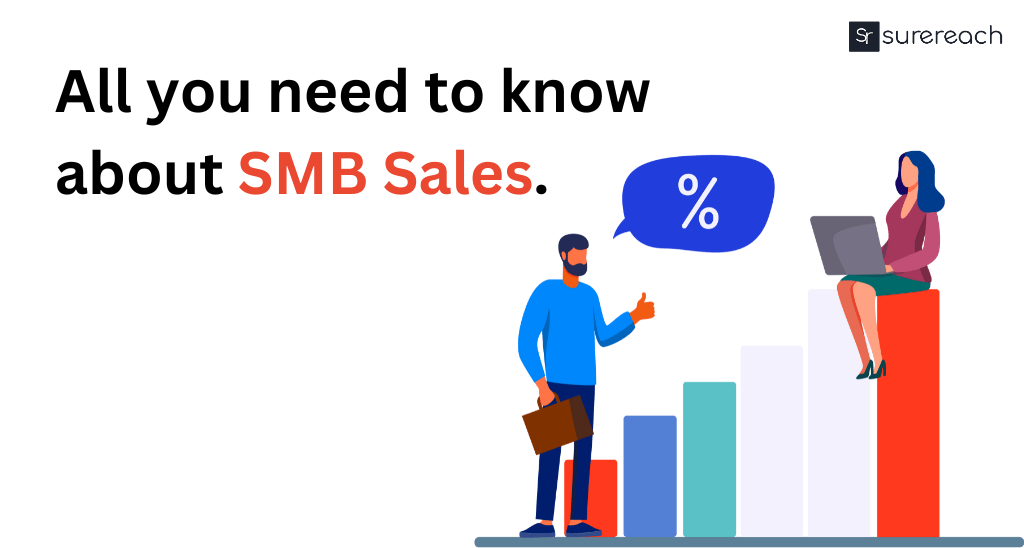Selling to small and medium-sized enterprises (sometimes referred to as “SMB sales”) necessitates a certain strategy and set of abilities. The demands of customers in these marketplaces differ greatly from those of large businesses.
Everything you need to know about SMB sales and how to put an SMB sales plan into practice will be covered in this article.
SMB Sales
SMB refers to small and medium-sized enterprises. Although the numbers are arbitrary, some definitions classify small firms as having less than 100 employees and medium enterprises as having fewer than 1,000. For instance, small enterprises are categorized by the U.S. Small Business Administration based on their average annual revenue and staff count.
SMB owners are frequently still heavily involved in all decision-making, and they handle operations differently from corporations, which are more heavily bureaucratized. SMBs are frequently distinguished from large organizations by the particular difficulties they have since they may not have the same resources at their disposal.
SMBS Full Form in Sales
Selling goods or services to small and medium-sized enterprises is known as SMB sales.
Known most popularly as “SMBs,” this market segment often includes companies of the following sizes:
- Small: employing 100 people or less
- Mid-Market/Medium: 101–1,000 workers
The number of employees is not a hard-and-fast rule when it comes to defining what makes a “small” vs a “medium” firm, despite the fact that these figures are generally acknowledged across sectors. Annual revenues are one of the criteria used by the U.S. Small Business Administration, for instance, to define firms.
SMBs are typically fresh startups or locally owned companies. Sales representatives working with small and medium-sized businesses (SMBs) must become proficient in a particular technique in order to customize their pitches to meet the special demands and obstacles of these companies.
SMBS Meaning
The best selling features for SMBs are goods or services that:
- Boost effectiveness
- Reduce expenses
- Increase income
Make sure you meet at least one of these fundamental requirements when conducting business with small firms in your B2B sales.
Moreover, SMBs prioritize building relationships. Post-purchase support is crucial to your buyers, so reassure them and provide them a roadmap for successful onboarding and ongoing customer support.
Beyond that, it’s critical to continue implementing additional B2B sales best practices, such value-driven follow-ups and client education.
Sign up and get 20 credits for free!
We have 3 million+ contacts stored to connect you with prospects all over India
What is SMB Sales?
Sales representatives for SMBs frequently speak with the CEO (or another extremely high-level employee) directly. Put otherwise, their technological understanding can differ from yours or that of some of your specialized company shoppers.
Make sure your sales message is clear and easy to comprehend in everyday language. Talk less about the specifics of each product feature and more on how you can satisfy their needs.
- Advantages of Offering SMBs
It is a common error made by salespeople to prioritize corporate sales over SMB sales, which are more challenging but ostensibly more profitable.
Representatives that go that path are losing out on a significant amount of money. Although SMB sales may need a distinct and focused strategy, the rewards may far outweigh the effort.
- Shorter Cycle of Sales
Sales cycles for SMBs are often shorter than those of bigger businesses. Because of this, salespeople may potentially close more deals in less time and generate more income than they might in the case of companies with more intricate sales procedures.
- Less Complex Communication
Sales to SMBs usually require less bureaucracy and red tape. Less filters and stakeholders are involved in the decision-making process, and the prospect’s organization often just has one or two persons in the communication chain.
- Quicker Generation of Leads
In America, there are more than 33 million small and medium-sized enterprises, making up more than 99% of all companies. As a result, sales representatives have access to a huge lead pool for prospecting. In SMB sales, lead generation may be an enjoyable, thrilling, and extremely lucrative activity if you can streamline the procedure.
SMB Sales Strategy
Three key tactics that sales representatives in small company sales should constantly remember are as follows:
- Make conversations personal
- Show consideration for the owner’s time, and
- Simplify their life
- Consider the owner’s timing constraints.
You have to be the adaptable partner when it comes to selling to SMBs. Getting a small company owner to offer you their valuable time takes precedence over issues like pricing, service conditions, and even competition. Establish a policy of making and keeping appointments, but maintain flexibility to work with your client’s schedule.
- Maintain brief, private, and intimate exchanges.
The last thing a small business owner may want to deal with is a tiny platoon of suited entrepreneurs. Your prospect could feel more at ease wearing jeans rather than slacks and perhaps favor conducting business with someone they can easily get along with. However, it’s possible that they would rather do business while wearing polished shoes and suits.
Gain a thorough grasp of the issues that your prospect is facing on both a personal and professional level. Establishing rapport is the first step towards developing a connection; everything else will come more easily.
- Give usefulness priority.
Small company clients need to be able to easily integrate whatever you sell into their current workflows. Offer solutions that will work well with their present company and make sure they receive whatever assistance or training they want. The more user-friendly your service is, the more probable it is that your client will be able to benefit from it right away to save money, reduce expenses, or boost income.
SMBs are driven by a range of factors, thus your solutions must support them in achieving their objectives. A proficient business-to-business salesman discovers a means to assist customers in realizing their goals while maintaining integrity and decency. Regardless of customers’ goals for growth or stability, as well as their substantial or little budgets, you should work with them to improve productivity, cut expenses overall, and proactively manage their income. Be a positive influence on their company.
It is seen that some startups grow into larger companies in the future. As a result, while looking beyond your quarterly sales targets, try to develop long-lasting customer connections for the rest of your professional life. You transcend the role of a salesperson when you put your clients’ welfare first. You are their successful partner.








Sanidhya Arora
More posts by Sanidhya Arora